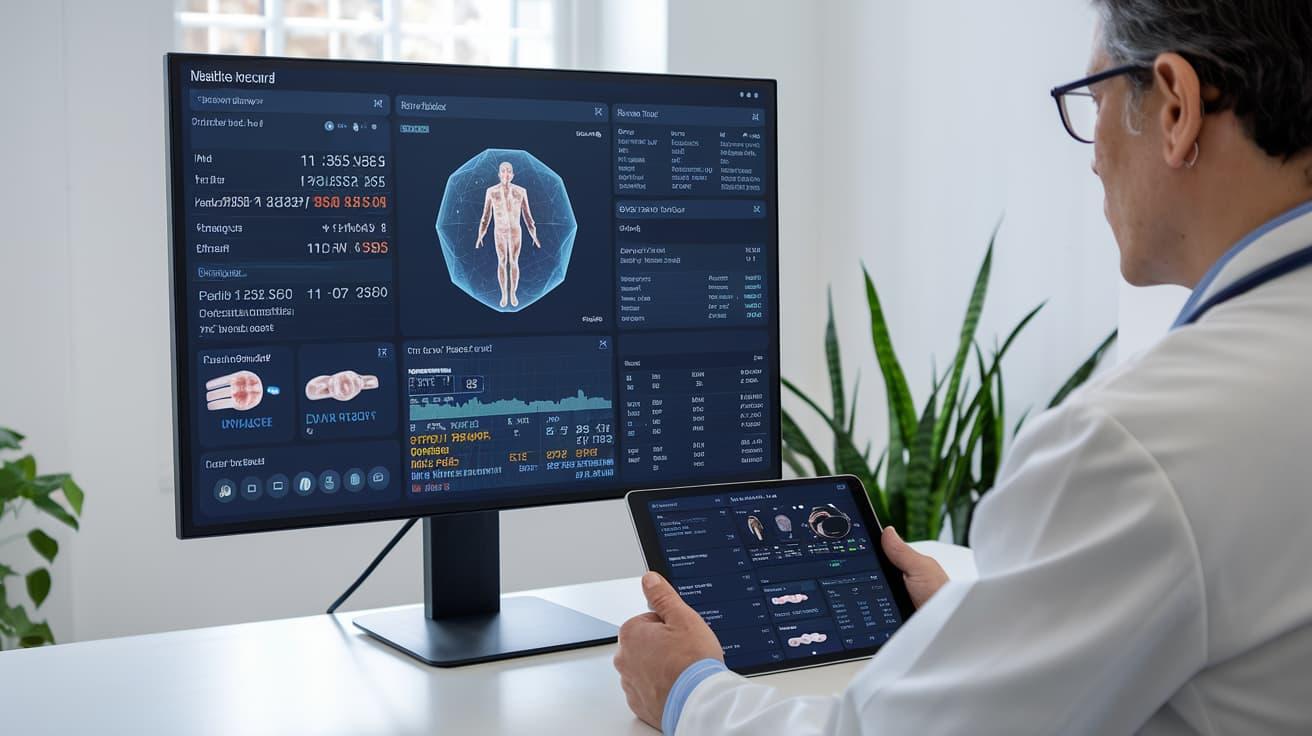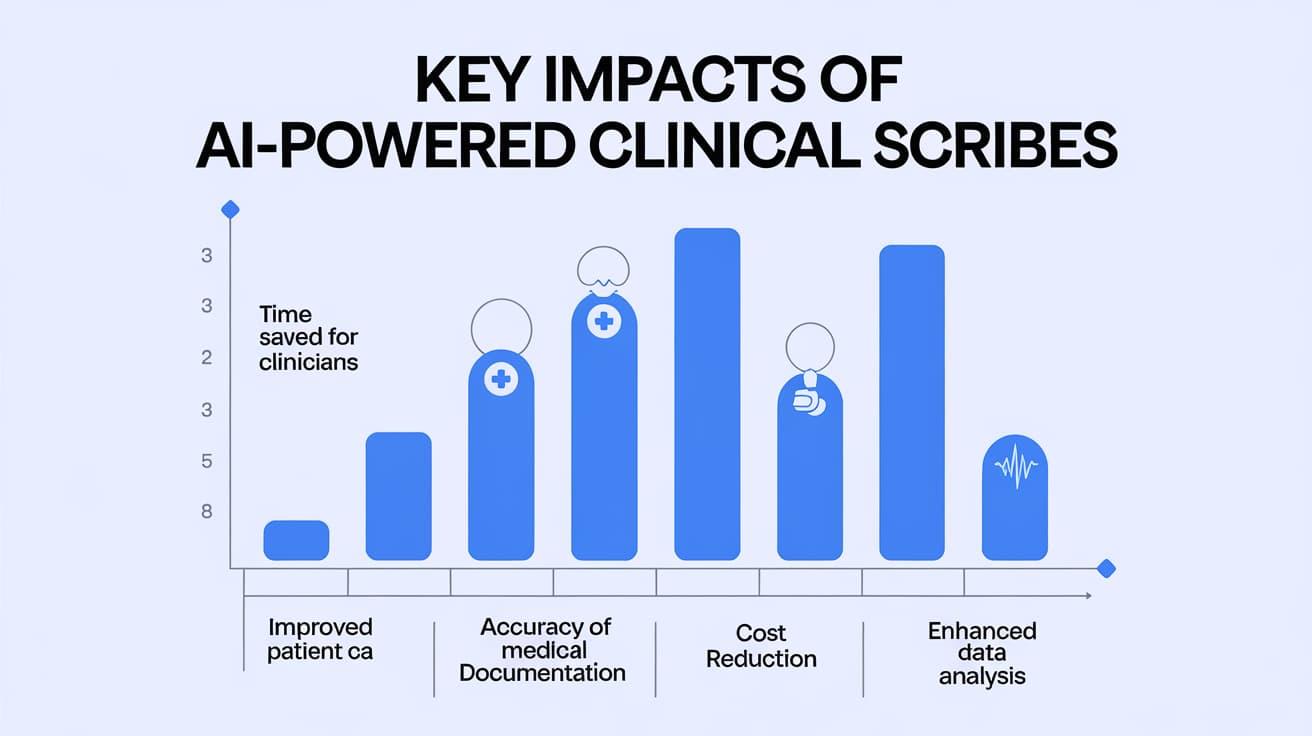Real-Life Impact of AI Scribes on Clinical Efficiency
Ai Clinical Scribe
April 21, 2025

How do AI-powered scribes change life? AI-powered scribing is changing lives in today's rapid healthcare industry, going far beyond simply saving time. This smart technology is completely changing how medical personnel record and provide treatment.
From lowering physician burnout to improving patient relationships. Let's explore the real-life impact of AI-powered scribing in healthcare software in routine clinical settings, where it matters most.
What exactly are AI Clinical Scribes?
An AI clinical scribe is a powerful digital assistant that uses artificial intelligence to assist medical professionals in handling the taxing work of clinical recording. AI scribes use tools like machine learning and natural language processing (NLP) to record, analyze, and interpret real-time patient-provider talks.
They are producing precise and organized documents for electronic health records (EHRs). These AI-powered solutions serve as virtual assistants during doctors' appointments, freeing up doctors to concentrate on patient care rather than being dependent on their computers.
A New Era of Documentation: What AI Scribes Bring to Healthcare
During a healthcare conference last year, a poll revealed that 59% of practices spend five or more hours a week on documentation, while 20% of providers spend twenty hours or more. According to the same survey, 90% of medical professionals had a positive assessment of AI's ability to streamline workflows, reduce provider and staff burnout, and save time on documentation.
patients. As a result of the time savings on clinical documentation, 70% of respondents think they could spend more time with patients, which would improve the quality of care. Other respondents said they would prioritize seeing more patients, paying more attention to other important tasks, or just getting home on time for a better work/life balance.
How Far Have We Come From Paper Charts to AI?
Medical documentation has gone from handwritten notes on paper to electronic health records (EHRs) and now intelligent scribing. Clinicians tend to spend more time typing than caring, so the shift hasn't been easy.
- AI scribes are here to change that by making documentation easier to read and better.
- It helps doctors to focus on patient care by listening, understanding medical terminology, and writing real-time notes.
- AI scribes are more free of mistakes, scalable across departments, and don't get worn out like manual note-taking or traditional scribes do.
Key Impacts of AI-Powered Clinical Scribes

The impact of AI medical scribes has never been greater. AI scribes are needed for medical procedures as healthcare facilities accept automation. They improve the overall patient experience by allowing doctors to spend more time interacting with patients rather than doing paperwork.
Healthcare's Increasing Requirement for AI
The healthcare sector is dealing with never-before-seen difficulties, such as growing patient demands and administrative workloads. Physicians now spend hours entering data into electronic health records (EHRs) due to the overwhelming expectations of documentation.
According to studies, doctors spend around two-thirds of their day on administrative chores that limit their ability to focus on patient care.
AI medical scribes stand out as a game-changing instrument in the creative solutions to these problems brought about by the increasing integration of technology into healthcare. They are intended to address physician burnout, reduce administrative burden, and empower healthcare professionals to provide individualized treatment.
Handling Overload in Administration
EHR systems' complexity often results in ineffective patient interaction documentation. Doctors have to spend significant time navigating between templates, medical codes, and compliance standards. This procedure is simplified by AI medical scribes that automate the collection and entry of pertinent information. So they free up physicians to focus on more urgent duties.
Overcoming Physician Burnout
Alarming rates of physician burnout have been exacerbated by the ongoing burden of juggling administrative tasks and patient care. AI scribes complete documentation during consultations in real-time, which helps minimize work done after hours. Healthcare professionals benefit from a better balance between work and private life. This will improve their mental health and sense of fulfillment at work.
Rising need for personalized care
Patients are demanding personalized treatment, with clinicians taking the time to learn about their particular requirements. AI scribes make this possible through the ability of physicians to interact with patients more deeply, thus improving the standard of care.
How Do AI Scribes Fit Seamlessly into Modern Healthcare Software?
The tools that clinicians now use can easily be integrated with modern AI scribes. They remove the need for manual uploads or a double entry by connecting directly with popular EHR platforms like Epic, Athenahealth, and Cerner. Clinicians don't need to learn a new system thanks to this easy-to-use method. The scribe just works in the background, gathering data and updating records instantly.
Because it allows patients to get care remotely, telemedicine has been increasing rapidly in recent years. There are special difficulties with it as well, especially when it comes to paperwork and keeping a smooth process.
1. Documentation in Real Time
AI medical scribes may record telehealth sessions, extract important data, and update EHRs in real time during virtual visits. It provides quality without interfering with the discussion.
2. Improving Remote Care Efficiency
Managing extra technologies is a common task in telemedicine, which might cause delays. By automating the documentation process, AI scribes make this easier and lessen the administrative load on providers.
3. Keeping Compliance
AI scribes build confidence between patients and physicians. Through safely collecting and processing patient data during telehealth visits, which ensures compliance with HIPAA and other standards.
Proof in Practice: Real Stories, Real Result
Doctors can build greater connections with their patients when they are not distracted by making notes or EHR system navigation. The main focus of consultations shiftss to supportive communication, active listening, and eye contact.
AI scribes help in the study of patient data to find patterns or areas where treatment is lacking. This guarantees that patients receive individualized treatment programs that are founded on current and reliable data.
Making healthcare more accessible to everyone can be achieved by lowering the administrative burden. So that doctors can spend more time with underprivileged patients or make more appointments available.
Challenges in AI Medical Scribe Application
AI medical scribes provide advantages, but there are drawbacks as well that must be considered.
1. High Cost
Smaller practices might find it difficult to afford investments in AI technologies, including hardware, software, and training. Many providers find that future cost savings outweigh the cost. AI clinical scribes have a package that costs less as compared to any other medical scribes.
2. Curve of Learning
Training is necessary for healthcare personnel and providers to adjust to AI scribes. Support services and clear training programs can facilitate this shift.
3. Managing Tough Situations
Highly specialized or complex medical cases may be difficult for AI scribes to deal with needing human oversight to guarantee accuracy.
4. Privacy Issues
Patients may be worried about how AI systems handle and retain their data. Building trust requires openness and respect for privacy regulations.
Use All Clinical Scribes to Get Your Time Back
Are you ready to put your patients above paperwork? Advanced AI medical scribe solutions from AI clinical scribe are designed to reduce your documentation workload and increase precision and productivity. So you know well now about the real life impact of AI-Powered scribing in healthcare software.
Take the first step toward more intelligent, patient-centered treatment by visiting AI Clinical Scribe right now!

